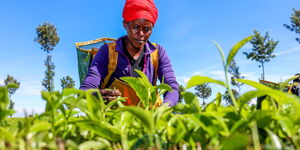Kenyans in recent weeks have felt the pinch as tomato prices around the country experienced a massive surge following a shortage.
The scarcity has seen the price of tomatoes double and triple in some areas, posing a challenge to many families already struggling in a depressed economic environment.
A crate of tomatoes which used to go for around Ksh 6,000 now costs as much as Ksh 10,000 to Ksh 12,000 depending on the seller.
According to experts, the shortage was occasioned by heavy rains which pounded parts of the country in December 2019, causing heavy damage to tomatoes growing on various farms.
The rains, for instance, destroyed several farmers' tomatoes in Kirinyaga as heavy rains which hit the county in November 2019 continued until January 2020.
“Swathes of our land were submerged in water, leading to the wash-away or complete destruction of tomatoes.
“Because it became difficult to spray pesticides on the crops, as the rainwater would wash away the chemicals, the few remaining tomatoes decayed in the farms,” Jacqueline Wanjiru, a tomato farmer in Kirinyaga, explained to K24 TV.
Traders who spoke to the same station lamented that Kenyans had resorted to buying single tomatoes as opposed to large quantities.
“Customers are only buying one tomato per visit, and the tomato goes for at least Ksh10,” a grocer in Pangani, Nairobi observed.
Other agricultural products affected by the rains are potatoes and other vegetables.
Traders at Kongowea Market, Mombasa explained that damage to the road network due to the heavy rains had also contributed to the scarcity and price surge.
“Very few lorries are bringing tomatoes to the market this Christmas season. And this is because many farmers across Kenya had nothing, or little, to harvest during the rainy season," Julius Muthegi, in charge of the market's tomato section, told reporters.












